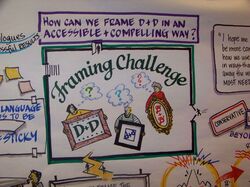 At the 2008 National Conference on Dialogue & Deliberation, we focused on 5 challenges identified by participants at our past conferences as being vitally important for our field to address. Our leader for the “Framing Challenge” was Jacob Hess, then-Ph.D. Candidate in Clinical-Community Psychology at the University of Illinois. Jacob wrote up an in-depth report on what was discussed at the conference in this challenge area, as well as his own reflections as a social conservative who is committed to dialogue. Download the 2008 Framing Challenge Report (Word doc). Framing Challenge: Framing this work in an accessible way How can we “frame” (write, talk about, and present) D&D in a more accessible and compelling way, so that people of all income levels, educational levels, and political perspectives are drawn to this work? How can we better describe the features and benefits of D&D and equip our members to effectively deliver that message? Addressing this challenge may contribute greatly to other challenges. Challenge Leader: Jacob Hess, then-Ph.D. Candidate in Clinical-Community Psychology at the University of Illinois Here is a taste of Jacob’s thoughtful report: As a social conservative who has found a home in the dialogue community, I was invited to be “point person” for this challenge at the 2008 Austin Conference. The different ways we talk about, portray and frame dialogue can obviously have major differences in whether diverse groups feel comfortable participating in D&D venues (including our coalition). Of course, conservatives are only one example of a group for whom this challenge matters; others who may struggle with our prevailing frameworks include young people, those without the privilege of education, minority ethnic communities, etc. As I learned myself, even progressive people may be “turned off” from a particular framing. After becoming involved in dialogue, I would share what I was learning with classmates and professors during our “diversity seminar.” When hearing about dialogue framed from their white, male, conservatively religious classmate, several of my classmates decided that dialogue must really be a conservative thing—i.e., an attempt to placate, muffle or distract from activism and thereby indirectly reinforce the status quo (a valid concern!). Ultimately, however, in each case I believe these fears are less inherent to dialogue or deliberation itself than to a particular framing of the same. Does dialogue inherently serve either a radical or status quo agenda? Does it require someone to either believe or disbelieve in truth? Does it implicitly cater to one ethnic community or another—one age group above another—one gender or another? I think not. Having said this, little cues in our language and framing may inadvertently communicate otherwise. . . After being identified by the NCDD community (alongside 4 other key challenges), the articulation of this challenge was explored and elaborated in an online discussion of members of NCDD; ultimately, the challenge came to read: “Articulating the importance of this work to those beyond our immediate community (making D&D compelling to people of all income levels, educations levels, political perspectives, etc.) — and helping equip members of the D&D community to talk about this work in an accessible and effective way.” This “challenge #2” is intended to draw our collective attention to how we can make dialogue and deliberation more accessible to more communities—not necessarily by radically altering the practice itself, but my making sure the packaging, the framing and presentation doesn’t inadvertently scare them away. As reframed by Steven Fearing, the “core question” for this challenge becomes: “How can we frame (speak of) this work in a more accessible and compelling way, so that people of income levels, educational levels, and political perspectives are drawn to D&D?”
0 Comments
Your comment will be posted after it is approved.
Leave a Reply. |
Categories
All
|
Follow Us
ABOUT NCDD
NCDD is a community and coalition of individuals and organizations who bring people together to discuss, decide and collaborate on today's toughest issues.
© The National Coalition For Dialogue And Deliberation, Inc. All rights reserved.
© The National Coalition For Dialogue And Deliberation, Inc. All rights reserved.

 RSS Feed
RSS Feed